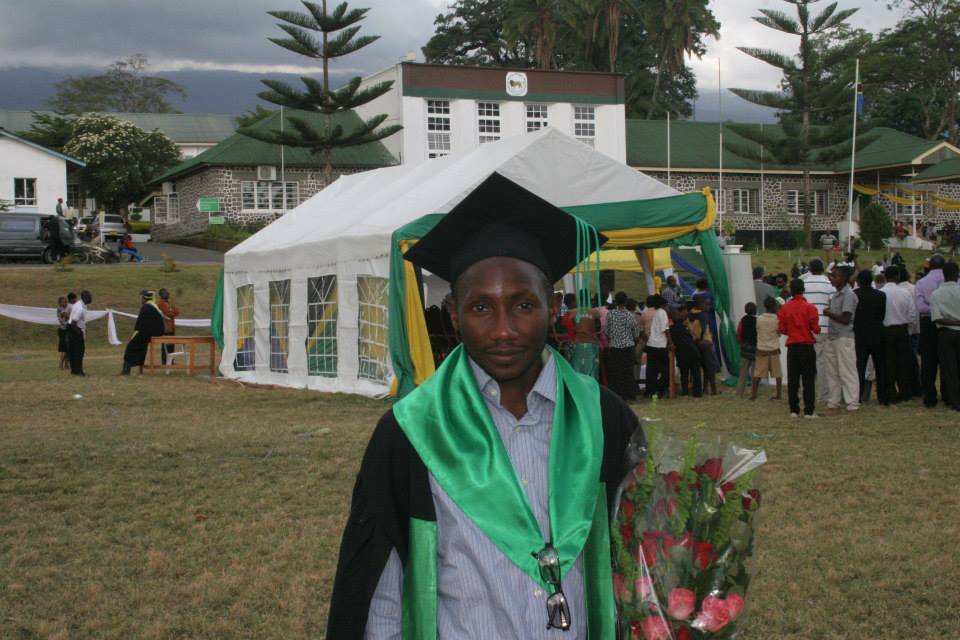|
<NEWS>
The 1st MWCS Scholarship Student Awarded Diploma
Kazuhiko Hosaka
Co–chairman, Mahale Wildlife Conservation Society (MWCS) I am pleased to announce that Mr. Butati R. Nyundo, a grantee of the MWCS Special Scholarship, successfully completed a two-year course programme for ordinary diploma in wildlife management at the College of African Wildlife Management, Mweka (CAWM), Tanzania and attended the graduation ceremony taking place on the 25th of October, 2013 in order to get his diploma (Photo 1). This was MWCS's first attempt to offer an opportunity for high education to a prospective young person eager for wildlife conservation at Mahale. We will examine how it will work and what we can do to contribute to the community–based conservation in this area, while keeping in touch with Mr. Nyundo and giving him support, if necessary. We hope conservational efforts will thrive at Mahale in the hands of the Tongwe, the indigenous people there. Mr. Nyundo himself aspires to work for the Mahale Mountains National Park and to contribute to protection of the natural environments from any kind of harmful factors. The following is his report on his three-month activities as a volunteer teacher at Buhingu Secondary School and Katumbi Primary School. Such activities had been assigned him by MWCS as an extended programme of the scholarship. Acknowledgements are due to all those who have supported our aims and activities as members and⁄or donors. 
My teaching experience at my hometown
Butati R. Nyundo
Mahale Mountains National Park As soon as I completed my studies at CAWM, I went back to my hometown Kigoma for volunteer activities. It was a welcoming idea to me as I had desired to have such a chance as to contribute something to my community consisting mainly of the Tongwe people. Teaching secondary school students and primary school kids turned out an incredible experience. I started to teach as a volunteer at Buhingu Secondary School in the middle of January 2013. I considered it particularly valuable to work for the secondary school, because it enrolled students from as many as six villages, which meant that I could be involved in the biggest part of the community. On the first day, I was introduced to the school administration and the students with a warm welcome from everyone. I was assigned to teach biology to all classes of Form 1?4 and geography to one class of Form 3. Teachers and students were very friendly to me, and it did not take me so long to get used to the environment. Students looked inspired by my presence as they came to know that a person like me from their own community could attain higher education. And I in turn was motivated and encouraged to work harder by their eagerness to learn new ideas especially concerning with wildlife and environmental conservation. They made efforts to improve their environment by planting trees around the school compound and did their best to stop bush fires. I gave several talks about environmental conservation to different classes and the Roots and Shoots Tanzania club. The school management acknowledged my efforts and influence on the students and appointed me as assistant of sports and counseling master. I took the school football team to three different games where we got two wins and a draw. I also made several advices to students how they should study to be more successful. How wonderful it was for me to see boys and girls work harder as a result of my advices! However, due to remoteness, the school was facing many problems concerning its facilities and equipment. I interviewed with the staff and made a list of the prioritized needs at Buhingu Secondary School, which was then attached to this report submitted to MWCS. In early March, Nomad Tanzania, a safari company managing a camp at Kangwena Beach of the Mahale Mountains National Park, offered us a day trip to the park by its boat. The trip comprised of eighteen students, one teacher and me. We took students of thirteen years or more, in accordance with the code of conduct for chimpanzee viewing. My role was to accompany them as their guide, wildlife expert and a native of that area. I did my best to offer the students the explanation of the park; the history of Mahale, conservation activities, resources, chimpanzees, Lake Tanganyika and cichlids unique to this lake (Photo 2). We had a chance to meet Mr. Shunkichi Hanamura of Kyoto University, who stayed at the research station as a member of the Mahale Mountains Chimpanzee Research Project that had persisted since 1965. The students enjoyed the trip very much and seemed to comprehend the significance of conservation activities undertaken in the area. I spent the final month of my volunteer work in teaching at Katumbi Primary School, which was very special to me because Katumbi is my home village. Children start to attend school at the age of 5 or 6 years. Training such young kids requires more effort than at secondary education, but unfortunately, the school had a severe shortage of teachers. I was assigned to teach science and geography to Class 7, 6, 5 and 4. Besides a shortage of teachers, the school was struggling with the poor conditions concerning desks, sports equipment and some facilities in need of repair. Nevertheless, some students performed very well above average in their studies. Now that three month volunteer activities have been over, I am very happy and proud to have such an opportunity as to work at Buhingu Secondary and Katumbi Primary Schools. Once again, I would like to thank MWCS for their full support of my two years diploma course at the CAWM and the three months livelihood support during my volunteer activities. 
Photo 2. Mr. Nyundo answering questions from secondary school students in the forest during a day trip to Mahale Mts. National Park. Photo by Mr. Shunkichi Hanamura. Back to Contents |